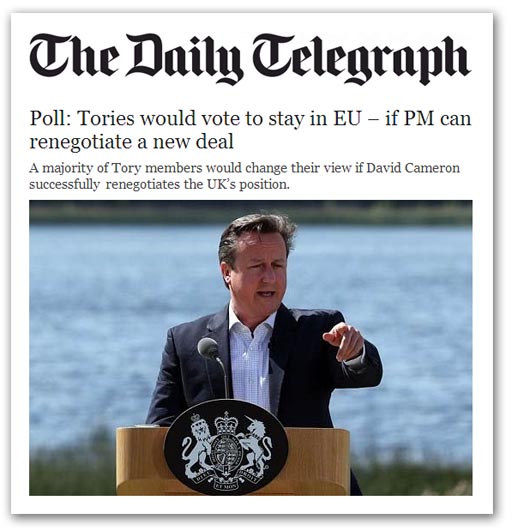EU politics: Europlastics rule the Conservatives
Thursday 20 June 2013
However, according to the Telegraph Media Group's finest, 54 percent of Tory grassroot members do not meet the most rigorous definition of "eurosceptic". This comes from a recent YouGov poll carried Queen Mary, University of London, and the University of Sussex, which starts well enough. It tells us that 71 percent of Tories would vote to leave the EU if a referendum was held now, with only 20 percent wanting to stay in. But, if Mr Cameron achieves "a deal with the EU that protects Britain's interests" – whatever that might be – a multitude of rats desert the eurosceptic ship and 54 percent of Tories end up wanting to stay in the EU. Just 38 percent say they want to leave. Tim Bale for the Telegraph thinks that these Tories are eurosceptics, but "they trust David Cameron's strategy on the European Union". Actually, it isn't a strategy, as such, unless you take fooling the gullible as one. And before you draw any particular conclusions, you have to look at earlier results. As we saw earlier, the survey in July 2012 had 48 percent wanting to pull out and 31 percent wanting to stay in the EU, across the political divide. However, if a new deal was renegotiated, the poll suggested that people would vote in a completely different way. Most – 42 percent - would vote to stay in the EU and only 34 percent wanted to leave. And, with Tories, the percentages are very similar to what they are now, with 55 percent wanting to stay in, versus 34 percent wanting to stay in. Where there is a difference is in the number of Tories wanting to leave without there being negotiations. In July last year, 58 percent would have left, so the current 71 percent represents a significant hardening of sentiment. Nevertheless, the crunch figure is almost unchanged: 55 percent of Tories would buy renegotiation last year, and 54 percent buy it now. What we are seeing, therefore, is very much what we have seen before – an ossifying of sentiment with very little change over time, despite the more intense narrative and the rise of UKIP. For me, that is the important thing. People's views have hardened and they are not being influenced by the debate. Thus, how they will behave if we get a referendum, much less a negotiation, is hard to judge. But there is no great cause for optimism. COMMENT THREAD Richard North 20/06/2013 |
Bailiffs: the Government acts
Thursday 20 June 2013
Back then, in September 2011, we had obtained from West Yorkshire Metropolitan Police confirmation that a particular form of behaviour, the "phantom visit" which then led to massive overcharging, was in fact fraud. Yet, despite this admission, and formal complaints to my own local authority, nothing changed, and neither did the Police take action, even though they acknowledged that there was de facto evidence of offences having been committed. They had other priorities to occupy them, not least disposing of a disgraced Chief Constable. A month later, I also had other priorities – a trip to the menders to acquire a porcine spare part, which gives one a somewhat different perspective on life. With that, we allowed the ball to roll gently to the edge of the field, although the momentum never completely dissipated. We still have things on the go. However, no less than Eric Pickles, Communities Secretary has picked up the ball. An old Bradford hand, his stock is quite definitely on the rise. Scarcely reported by the media – which says a great deal about how detached they are from real people and real concerns – Mr Pickles did at least make the pages of one of the Telegraph Media Group's sales brochures. This told us that "Ministers have ordered local authorities to rein in over-zealous bailiffs hired to collect council tax and parking charges". The detail, though, is in recently issued guidelines which, as things go, are extremely interesting. Called "guidance to local councils on good practice in the collection of Council Tax arrears", these tell local authorities that they cannot dump the responsibility for collection of debt on the bailiffs and walk away. They remain responsible for the action of their contractors. Councillors, the guidelines say, "should regularly scrutinise the operation of outsourced contracts; and the broader use of such recovery action must command and continue to command public support and confidence". As to our particular issue on concern, the local authorities are told that, "Public concern has been raised about the practice of some bailiffs undertaking 'phantom visits' – charging fees for action when no action was actually taken". And then we have the money quote: The Government consider that any fraudulent practices should be reported to the police as a criminal offence under the Fraud Act and that Local Authorities should terminate any contract with companies whose activities are proved fraudulent.Back when we started all this, it took some serious pressure even to get the police to accept my complaint and that has been the common experience. Invariably, we get the mantra from the police, "civil action". But now there is a Government department telling us that bailiff malpractice should be treated as a criminal offence. Mr Pickles has taken a major step forward. COMMENT THREAD Richard North 20/06/2013 |
Defence: no combat immunity
Wednesday 19 June 2013
This is an issue which we have rehearsed on this blog and more generally on Defence of the Realm, to the extent that we have very little further to say. When I spoke to Sue Smith earlier today, though, she was both thrilled and weary, having lived with the death of her only son for nearly eight years, only now to get to the stage where she can challenge the MoD in open court. As it stands, nothing has been proven – all Sue has managed to do is earn the right to sue. Whether the MoD actually breached their duty of care in requiring Sue's son, Pte Phillip Hewett and others, to patrol in a Snatch through al Amarah in southern Iraq on 16 July 2005, has now to be established, and that is going to take some seriously hard work. Interestingly, at the inquest on 30 January 2007, Major General (now General) Sir Peter Wall gave evidence in defence of the decision to use the Snatch, saying: ...if we … had decided that we were going to put the armour protection of specific vehicles as our highest priority and we had conducted all of our patrolling in Challenger tanks and Warrior fighting vehicles in urban areas where there is quite a lot of support and sympathy for our presence, it was our expectation that this would have generated a wholesale adverse reaction, which would have greatly increased the span of threats to our presence in southern Iraq.Sir Peter is now Chief of the General Staff, the professional head of the Army, so this case goes right to the very top of the Service, challenging the decision-making at the very centre of power. Contrary to some rather superficial comment, therefore, this case does not "open the floodgates" for soldiers or their relatives to second-guess the decisions of field commanders, and especially decisions taken in the heat of the moment. The case goes to the heart of Army decision-making at the very highest level, where the use of Snatches was decided upon for political rather than operational reasons. The limitations of the case have been made clear by the majority of the Justices (five), who held that the Snatch Land Rover cases should not be struck out but that the extent of any duty owed, and whether such duty was breached, will be fact specific and have to be explored at trial. Lord Hope made clear that in deciding whether or not the state had breached its duties, the courts should not impose an "impossible" or "disproportionate" burden on the authorities. Equally "the widest measure of appreciation" must be given to commanders for decisions taken on the ground and actively involved in armed conflict. That this case will ever see the light of day is in some measure due to the generosity of Sunday Telegraph readers, who responded to an appeal by Christopher Booker, and to readers of this blog who did likewise, enabling Sue to proceed at a critical juncture when legal aid was being withheld. The broader background to Snatch incident is set out in my book Ministry of Defeat, which got as close to the facts as we could. Now we may find ourselves able to add more to the narrative, and get even closer to what went on, which has been Sue's objective all along. COMMENT THREAD Richard North 19/06/2013 |
EU politics: calling the EU bluff
Wednesday 19 June 2013
Confronted with criticism of the European Union, its supporters would often retort that there could not be so very much wrong with it, to judge by all the countries queuing up to join.
In that context, last month's halt to EU accession negotiations, announced by Sigmundur Davíð Gunnlaugsson, the newly-elected prime minister of the independent state of Iceland, was of more than just of local significance. This, alongside Norway and Switzerland, which had also turned away from membership, marked another blow for the self-confidence of the "colleagues", who had failed to convince the Icelanders of the merits of political union. The decision was formally announced to the European Commission by the country's foreign minister, Gunnar Bragi Sveinsson, saying crisply, that, "This is how democracy works". Both main parties in the recent general election had been against EU accession. A significant factor in the rejection had been the fate of Iceleand's fish stocks, which would have become a "common resource" under the EU's Common Fisheries Policy. And now, to confirm the vital role of fishing policy in that decision, we have Gunnlaugsson telling a Reykjavik crowd (pictured above) that the mackerel fishing dispute with the European Union as a prime example of the value of sovereignty. Gunnlaugsson was speaking during Iceland's National Day, marking its birth as an independent nation in 1944. He declared that the EU's demands that Iceland reduce its mackerel catch showed why the country needs to maintain its independence. "To apply illegal sanctions against a small nation for catching fish in accordance with scientific guidelines and within its own economic zone, at the same time as larger nations are making catches from the same stocks without any criticism being voiced", said Gunnlaugsson, "would hardly promise well for a common fisheries policy". Only from that stance could Iceland have responded to the latest round of bullying with such equanimity. Last week saw EU fisheries commission Maria Damanaki visit the island, threatening to impose sanctions unless the Icelandic government agreed to immediate negotiations. Dead-batting this bluster, fisheries minister Sigurður Ingi Jóhannsson calmly told her that Iceland had "expressed its sincere willingness to return to the negotiating table as soon as possible in order to find a fair solution to this dispute", but has since done absolutely nothing to resolve the Commissioner's angst. Well might Iceland take the EU's threats calmly. As have the cod moved north into sub-Arctic waters, so have the mackerel moved north into Icelandic waters, giving the Icelanders every right to increase their quotas, which indeed they have done. As we explained earlier, Iceland is more right than wrong and, if the EU had a good case for imposing sanctions on Iceland, and the neighbouring Faroe Islands, it would have acted already. Were either fishing nation in the EU, of course, there would be no possibility of them arguing with the all-powerful fisheries commissioner. Quotas would have been decided in Brussels, alongside national allocations, and that would have been the end of the matter. Farcically, though, one interested party left out of the discussions is UK fisheries minister Richard Benyon. Although he represents the strong Scottish interest in the mackerel fishery, he does not have a seat at the "top table" and has no power to negotiate directly with the Icelanders or even the Faroese. There can be few better illustrations of the fatuity of Mr Cameron's "top table" claim than the sight of Gunnlaugsson seeing off the EU, while Mr Benyon has to go cap-in-hand to Brussels to be given his marching orders by Maria Damanaki. COMMENT THREAD Richard North 19/06/2013 |
Politics: an equality of penalty?
Wednesday 19 June 2013
The call for jailing bankers undoubtedly reflects to growing public distaste for the breed, but one suspects that there are already sufficient sanctions to apply to those who fail in their duties. The problems seem more related to detection and enforcement, rather than the lack of any penalty. However, there is always a good case for reviewing the accountability of individuals who stray from the path of acceptable behaviour and recklessly cause damage or cost. But, if there is a case for change in this sector, then surely there is equal cause to move against the public sector. On Saturday, we saw a German call criminal sanctions against public servants for "financial infidelity", where there had been substantial and reckless waste of public money. What's good for the goose must surely be good for the gander. Thus, while one would not at all disagree with the idea that bankers should be held responsible for their actions, the principle should not be confined to this sector. Criminal sanctions, where appropriate, should apply across the board, and should apply equally to the public sector.
A few civil servants behind bars might to wonders for the quality of public administration.
COMMENT THREAD Richard North 19/06/2013 |


























